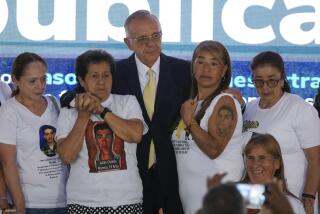Longtime Colombian rebel commander is killed
- Share via
Reporting from Bogota, Colombia — The Colombian armed forces delivered a major blow to the nation’s largest insurgent group, killing a key rebel leader at his base camp in a remote area of southeastern Meta state.
President Juan Manuel Santos, in New York to attend a session of the United Nations, confirmed Thursday that longtime rebel leader Victor Julio Suarez Rojas, 57, had been killed in an operation carried out Wednesday and early Thursday by 600 troops, led by special forces and supported by 27 helicopters and 30 other aircraft.
Suarez, known by the alias Mono Jojoy, was the acknowledged military leader of the Revolutionary Armed Forces of Colombia, or FARC. He was responsible for directing what authorities in Bogota describe as the rebels’ decades-long reign of terror and kidnapping. He was also part of the group’s seven-member secretariat, the ruling body, and commander of the rebels’ Eastern Bloc.
“This is historic news for our country,” Santos told reporters in an impromptu sidewalk news conference in New York that was broadcast here. “This is the most devastating blow to the FARC in its history. He is the symbol of terror and all the damage they have done to the country.”
The operation began with an intense bombing raid on the rebel camp, near the Macarena National Park and about 15 miles southeast of the town of La Julia. The site is about 150 miles south of Bogota, the capital.
Early Thursday, the military was able to enter the rebel camp and identify Suarez’s body. Twenty other rebels also were found dead, including those believed to be high-ranking members of the movement.
In a Bogota news conference, Defense Minister Rodrigo Rivera said the camp had long been a sanctuary for the rebels. It included concrete bunkers and tunnels.
The attack was led by the military’s Joint Task Force Omega, based in Ft. Larandia in Caqueta state, just south of Meta. The highly mobile airborne force has been modeled after U.S. special forces and includes accomplished jungle warfare fighters.
Rivera said one member of the Colombian armed forces was killed and five were wounded in the operation.
The killing of Suarez was the biggest blow to the FARC since 2008, when Colombian forces briefly invaded Ecuador to kill the rebels’ No. 2 leader, Raul Reyes. The invasion, ordered by then-President Alvaro Uribe, prompted Ecuador and Venezuela to mobilize troops along their borders with Colombia.
Later in 2008, FARC founder Manuel Marulanda died, apparently of natural causes, and a third member of the secretariat, Ivan Rios, was killed by a bodyguard, who later sought a reward.
After Marulanda’s death, Suarez lost out to Alfonso Cano as the new rebel supreme commander. Cano is thought to be holed up in a remote area in the central state of Tolima, and the Colombian military has said it has him cornered.
Suarez, who was born to a peasant family in Meta and joined the FARC in 1975, was wanted in the United States on drug-trafficking, murder and kidnapping charges. The U.S. State Department had offered a $5-million reward for information leading to his capture. FARC used proceeds from trafficking in cocaine to fund its operations.
Suarez “set the FARC’s cocaine policies, directing and controlling the production, manufacture and distribution of hundreds of tons of cocaine to the United States and the world,” said a State Department announcement of the reward.
Backed by $6 billion in U.S. military aid over the last decade, Colombia’s armed forces increasingly kept the rebels on the run, pushing them into ever more remote mountain and jungle areas. Casualties and desertions have trimmed the FARC’s ranks to fewer than 10,000 rebels, about half the total in 2002, when the group was at peak strength.
Kraul is a special correspondent.
More to Read
Sign up for Essential California
The most important California stories and recommendations in your inbox every morning.
You may occasionally receive promotional content from the Los Angeles Times.













